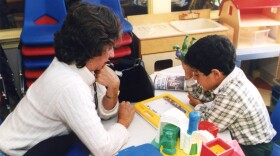From Texas Standard.
Based on a Houston Chronicle investigation that found the Texas Education Agency had capped access to special education services, the U.S. Department of Education has concluded that Texas violated federal law in a deliberate effort to lower the number of students receiving aid.
The investigation began in 2016, when Brian Rosenthal, then a reporter for the Houston Chronicle, noticed something odd. Compared to the rest of the country, Texas had the lowest percentage of students receiving special education services – around 8.5 percent. What he discovered was a so-called accountability system instituted by the TEA that appeared to arbitrarily cap how many kids were receiving special education services, by putting the squeeze on local schools. The TEA has always insisted it didn’t cap special ed services, but Rosenthal’s reporting, which he detailed in a Texas Standard interview, triggered the federal investigation.
Steve Aleman, an attorney for Disability Rights Texas, says his organization asked TEA about the 8.5 percent cap, and received no explanation or confirmation that the cap existed.
“It’s clear that there was a state policy that administrators of the top level of our state adopted without any consultation with stakeholders – even members of the legislature for that matter,” Aleman says.
Lawmakers have eliminated the special education caps. Aleman says it’s unusual for the federal Department of Education to take action in a case like this.
“This is a big deal,” Aleman says. “Certainly it is validation for students and those families that always felt shunned by the system.”
Aleman says now the state has to create a corrective action plan to remedy harm done by the special ed caps. Additionally, Aleman says, the federal action should provide momentum to those who want to fix the system.
Gov. Greg Abbott gave TEA Commissioner Mike Morath seven days to produce the corrective action plan. Aleman says future steps include involving stakeholders in crafting solutions that restore educational opportunities to children with disabilities.
Written by Shelly Brisbin.







